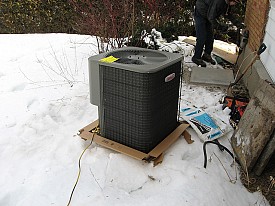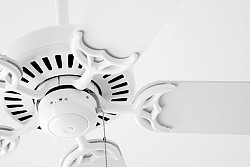Will You Need New Air Conditioning This Year?
 As the days get longer and (we hope) a little milder, thoughts start naturally turning to the warm weather ahead. The approach of summer means vacations, picnics, sunshine ... hurray! On a more practical note, it means thinking about the ol' air conditioning system, and whether it is going to make it through another season. Will you need new air conditioning this year? Consider the following 5 points to make the best decision for your home. And keep in mind that early spring -- the off season for HVAC technicians -- is the perfect time to schedule a consultation.
As the days get longer and (we hope) a little milder, thoughts start naturally turning to the warm weather ahead. The approach of summer means vacations, picnics, sunshine ... hurray! On a more practical note, it means thinking about the ol' air conditioning system, and whether it is going to make it through another season. Will you need new air conditioning this year? Consider the following 5 points to make the best decision for your home. And keep in mind that early spring -- the off season for HVAC technicians -- is the perfect time to schedule a consultation.
- Energy Efficiency
Expect an air conditioning system to last for 10-15 years on average, possibly up to 20. Be aware that every year, the new models launched on the market are more and more energy-efficient. Today's air conditioners often come with an excellent Seasonal Energy Efficiency Ratio (SEER) of 16 or above, as opposed to the pre-2006 standard of 10 SEER. As your present home cooling system nears the end of its useful life, the cost of replacing it will be increasingly counterbalanced by the potential savings on your electricity bills.
If you are satisfied with your current older-model A/C, consider at least upgrading it with a new high-efficiency compressor (the part that sits outside your home).
- Coolant Leak
Don't think that when an air conditioner runs low on coolant, the process is the same as your car simply running out of gas. Instead, a shortage of coolant shows that you have a leak somewhere in the system, usually in the refrigerant coil or the condenser coil. Although this type of leakage can be patched up with sealant, this is not a long-term fix. In addition, if your unit uses Freon (R-22 coolant), be aware that R-22 is no longer being manufactured due to its ozone-depleting effect, and will be banned completely in 2020. Check out replacement of your existing air conditioning with a unit that runs on more environmentally friendly R-410A.
- Cost to Repair
Have you been told by a trustworthy serviceperson that your system needs to be repaired? Use the "5000 Formula" to decide whether to repair or replace your air conditioner. Multiply the estimated cost to fix it times the age of the system. If you come up with an answer over 5000, then be wise and start looking to buy a new system. Take as an example a $650 repair quote for 10-year-old A/C. The calculation works out to: 650 X 10 = 6500, which is well over 5000. Not worth repairing the old air conditioning.
- Your Comfort
Remember to add your comfort to the total picture -- after all, that's the main reason to install air conditioning in the first place. If you and your family just aren't cool enough in summer, your cooling system may be inadequately sized for your home. (An overly large system can be just as problematic, raising your electricity bills by continually cycling on and off and failing to dehumidify your home's interior air.) Look at another possible reason, as well: your old A/C's performance might be decreasing because it is slowly but surely wearing out.
- Peace and Quiet
If your air conditioner is rattling or rumbling, don't just grit your teeth and put up with the annoyance -- or make immediate plans to replace it. Stop and investigate. The bothersome sounds just might stem from loose hardware (easy to fix!) or your ductwork going through a normal process of expansion and contraction. On the other hand, they could indicate a more serious issue with the air handler or compressor. A HVAC professional can tell you whether the noise is a warning signal that it's time to get out your wallet and shop for a replacement.
Laura Firszt writes for networx.com.
Looking for a Pro? Call us (866) 441-6648

Heating & cooling Average Costs
HVAC Contractors Experiences

Circulator Pump Repair Took Care Of A Minor HVAC Emergency

Fast Air Conditioning Repair Helps Us Beat Atlanta’s Summer Heat



